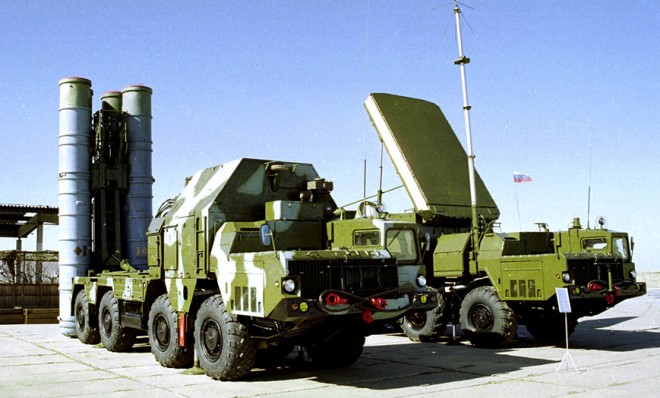Will Russia's advanced missiles prevent U.S. intervention in Syria?
The sophisticated weapons could make any Western attempt to impose a blockade or no-fly zone more dangerous


A free daily email with the biggest news stories of the day – and the best features from TheWeek.com
You are now subscribed
Your newsletter sign-up was successful
Russia has sent advanced antiship missiles to Syria in what U.S. officials called a "show of force." Moscow is one of embattled Syrian President Bashar al-Assad's last allies — and his most powerful. Moscow long ago admitted that it had supplied arms to Syria — including missiles — but insisted it only sent defensive systems. The sophisticated, radar-targeting these Yahkont antiship missiles have, however, would give Assad the ability to go on offense if the U.S. and other foreign countries try to intervene on behalf of the rebels in Syria's civil war.
The immediate fear is that this beefing-up of Assad's arsenal would make it more dangerous for the U.S. and other nations should they choose to further support rebels by imposing a blockade or otherwise plunge into the fight more directly. Ed Morrissey at Hot Air explains that these weapons "would allow Syria to fight any NATO or U.S. attempt to impose a no-fly zone." Russia denies reports of the arms sale, but Morrissey dismisses that as a transparent fib. "Russia has now clearly come down as an opponent of Western intervention, to the point of armed conflict by proxy." So much for the canard that post-Soviet Russia is not an enemy, he says:
Russia just upped the ante on intervention, and the question will be whether politicians in the U.S. use that opportunity to get realistic about the choices in Syria or beat war drums over the need to look "credible." [Hot Air]
The missiles are only one part of Russia's increasingly aggressive stand on Syria. The Wall Street Journal reports that Moscow also has sent at least a dozen warships to patrol near its naval base in Syria, which Russia sees as its foothold in the Middle East. U.S. and European officials, the Journal says, "see this as a newly aggressive stance meant partly to warn the West and Israel not to intervene in Syria's bloody civil war."
The Week
Escape your echo chamber. Get the facts behind the news, plus analysis from multiple perspectives.

Sign up for The Week's Free Newsletters
From our morning news briefing to a weekly Good News Newsletter, get the best of The Week delivered directly to your inbox.
From our morning news briefing to a weekly Good News Newsletter, get the best of The Week delivered directly to your inbox.
The buildup is seen as Moscow's way of trying to strengthen its hand in any talks over Syria's future and buttress its influence in the Middle East. It also provides options for evacuating tens of thousands of Russians still in Syria...
Moscow and Washington have worked publicly in recent days to assemble an international conference involving Damascus. But expectations are low that the meeting could lead to a political transition, as tensions have heightened around the region, and with the U.S. and Russia backing opposing camps. [Wall Street Journal]
Of course, the danger in Syria isn't just that the civil war — which has already killed more than 70,000 Syrians and driven millions more from their homes — will drag on longer than it might have because of Russia. "Equally the real concern about the Yakhont may be their potential transfer to Syria's Lebanese ally Hezbollah," says Jonathan Marcus at BBC News. "Israel has made it clear that a transfer of the Yakhont represents a red line that could prompt more air strikes against Syrian arms depots." That means Moscow may have just increased the odds that Syria's war will spill over its borders.
A free daily email with the biggest news stories of the day – and the best features from TheWeek.com
Harold Maass is a contributing editor at The Week. He has been writing for The Week since the 2001 debut of the U.S. print edition and served as editor of TheWeek.com when it launched in 2008. Harold started his career as a newspaper reporter in South Florida and Haiti. He has previously worked for a variety of news outlets, including The Miami Herald, ABC News and Fox News, and for several years wrote a daily roundup of financial news for The Week and Yahoo Finance.
-
 How Democrats are turning DOJ lemons into partisan lemonade
How Democrats are turning DOJ lemons into partisan lemonadeTODAY’S BIG QUESTION As the Trump administration continues to try — and fail — at indicting its political enemies, Democratic lawmakers have begun seizing the moment for themselves
-
 ICE’s new targets post-Minnesota retreat
ICE’s new targets post-Minnesota retreatIn the Spotlight Several cities are reportedly on ICE’s list for immigration crackdowns
-
 ‘Those rights don’t exist to protect criminals’
‘Those rights don’t exist to protect criminals’Instant Opinion Opinion, comment and editorials of the day
